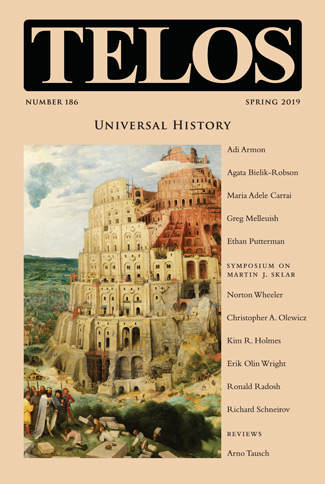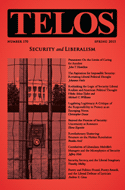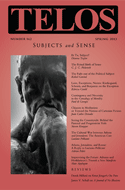By Russell A. Berman · Wednesday, August 26, 2020 The following essay comments on the interview with Hans-Georg Maaßen conducted by Moritz Schwarz and published in Junge Freiheit on August 14, 2020. An English translation of the interview appears here.
In the wake of the opening of the Berlin Wall and the collapse of the Soviet Union, it appeared that liberal democracy was on an inexorable victory march around the world. The Soviet satellite states threw off their Communist shackles, and the occupied Baltics regained their independence. Even Russia seemed briefly to be lurching toward modern governance structures, and the Central Asian states, the “stans,” claimed their own sovereignty (if only, often as not, to revert to indigenous forms of authoritarianism). The age of Latin American dictatorships belonged to the past, certainly in the southern cone and in Brazil, although not in Venezuela and Cuba. The last aftershocks of that democratic optimism informed the hope that toppling Saddam Hussein in Iraq would set off a similar democracy wave in the Middle East; no doubt the demonstration of the vulnerability of the dictator in Baghdad set the stage for the Arab Spring of 2011, another burst of hope.
That Arab Spring of hope gave way to a new winter in the Middle East and not only there. The wave of democracy has been followed by a wave of repression. Perhaps one should have paid more attention in 1989, which not only witnessed the November celebration in Berlin but also the bloody June in Beijing, where the democracy movement at Tiananmen was murdered by the Communist Party and its tanks. It was wrong to assume that the formal end of the Soviet Union meant the end of Communism altogether or that Communist agitation would cease to undermine free societies. That old mole continues to burrow.
Continue reading →
By Telos Press · Wednesday, August 26, 2020 The following interview was conducted by Moritz Schwarz and appeared in Junge Freiheit, on August 14, 2020. Published with permission. Translated by Russell A. Berman, who has written a separate note here.
Dr. Maaßen, the Mayor of Tübingen, Boris Palmer, has warned against a “world of prohibitions” in Germany, in which “moral condemnation” could follow the smallest mistake. This would “destroy liberal democracy.” Is he right?
Hans-Georg Maaßen: I am a jurist, out of passion, and that’s why I am frightened to have to agree with him in part. I am deeply concerned that our legal state—the rule of law—is being more and more undermined by the rule of morality.
Bärbel Bohley’s disappointed phrase is well known: “We wanted justice, but all we got is the rule of law.” Isn’t morality the better and ethically higher good?
Maaßen: No. It is true that the law only provides a moral minimum. Yet that is precisely the precondition of freedom.
Continue reading →
By Kim R. Holmes · Wednesday, May 1, 2019 Kim R. Holmes’s “A Man between Two Worlds: Assessing Martin Sklar’s Philosophy of Liberalism” appears in Telos 186 (Spring 2019), as part of a symposium on Martin J. Sklar. Read the full article at the Telos Online website, or purchase a print copy of the issue in our online store. Individual subscriptions to Telos are available in both print and online formats.
 Martin Sklar is an underappreciated thinker. The fact that he was a leading intellectual of the New Left in the 1960s and remained a self-identified leftist gave him a unique historical perspective. It enabled him to cut through many misunderstandings and clichés about the history of American liberalism, and gives us an opportunity to understand the left’s theory of community in a different light. One of Sklar’s central theses is his contention that the American system during the Progressive Era became a “mix” of capitalism and socialism. Looking at this background, one of Sklar’s more prescient theses is his distinction between the “broad left” and the “sectarian left.” This also informs his insightful idea of the “transvestiture of left and right”—that the left and right have largely changed historical places on ideas. The postmodern left is very different from, and indeed has largely broken off ideologically from, classic as well as mainstream liberalism as it has been understood in the past. One very important component missing from Sklar’s approach is religion. It must be recognized that the post-revolutionary construct in America helped ensure that the freedom of civil society as a liberal project could not fully flourish without the support of religion. Sklar’s work illuminates the great intellectual divide between classic liberalism and socialism, and between the moderate and radical Enlightenment legacies, which rest on two different views of human nature. However, if a choice had to be made between liberty and the dictates of community, Sklar always chose liberty. Martin Sklar is an underappreciated thinker. The fact that he was a leading intellectual of the New Left in the 1960s and remained a self-identified leftist gave him a unique historical perspective. It enabled him to cut through many misunderstandings and clichés about the history of American liberalism, and gives us an opportunity to understand the left’s theory of community in a different light. One of Sklar’s central theses is his contention that the American system during the Progressive Era became a “mix” of capitalism and socialism. Looking at this background, one of Sklar’s more prescient theses is his distinction between the “broad left” and the “sectarian left.” This also informs his insightful idea of the “transvestiture of left and right”—that the left and right have largely changed historical places on ideas. The postmodern left is very different from, and indeed has largely broken off ideologically from, classic as well as mainstream liberalism as it has been understood in the past. One very important component missing from Sklar’s approach is religion. It must be recognized that the post-revolutionary construct in America helped ensure that the freedom of civil society as a liberal project could not fully flourish without the support of religion. Sklar’s work illuminates the great intellectual divide between classic liberalism and socialism, and between the moderate and radical Enlightenment legacies, which rest on two different views of human nature. However, if a choice had to be made between liberty and the dictates of community, Sklar always chose liberty.
Continue reading →
By Timothy Melley · Tuesday, March 31, 2015
 Western societies increasingly imagine, plan, and even rehearse their own destruction. This cultural habit reflects a growing contradiction in democracy. On the one hand, liberal societies laud the ideals of participatory democracy, free speech, individual liberty, and governmental transparency. On the other, they grow ever more committed to the biopolitical regulation of life, the mitigation of threats to public health and safety, and the restriction of liberties as a way of securing liberty itself. How do we understand the inexorable growth of a security paradigm in liberal democracies? The answer lies partly in the cultural imaginary that shapes public contemplation of citizenship, liberty, and security. This imaginary reflects both the growing influence of biopolitics and the legacy the Cold War covert action. Paradoxically, the Cold War state’s growing commitment to covert action was itself increasingly public; as a result, public culture has became obsessed with, and enamored of, covert affairs. Despite state secrecy, most citizens believe they know the “kinds of things” their government is doing in secret—yet they cannot know in detail, and they receive most of their knowledge in the form of melodramatic fiction. The result is a growing irrationality in the democratic public sphere. Western societies increasingly imagine, plan, and even rehearse their own destruction. This cultural habit reflects a growing contradiction in democracy. On the one hand, liberal societies laud the ideals of participatory democracy, free speech, individual liberty, and governmental transparency. On the other, they grow ever more committed to the biopolitical regulation of life, the mitigation of threats to public health and safety, and the restriction of liberties as a way of securing liberty itself. How do we understand the inexorable growth of a security paradigm in liberal democracies? The answer lies partly in the cultural imaginary that shapes public contemplation of citizenship, liberty, and security. This imaginary reflects both the growing influence of biopolitics and the legacy the Cold War covert action. Paradoxically, the Cold War state’s growing commitment to covert action was itself increasingly public; as a result, public culture has became obsessed with, and enamored of, covert affairs. Despite state secrecy, most citizens believe they know the “kinds of things” their government is doing in secret—yet they cannot know in detail, and they receive most of their knowledge in the form of melodramatic fiction. The result is a growing irrationality in the democratic public sphere.
Continue reading →
By Telos Press · Monday, December 2, 2013  Telos Press is pleased to announce the publication of Ernst Jünger’s The Forest Passage, now available for purchase in our online store. Expertly translated by Thomas Friese, who previously translated Jünger’s The Adventurous Heart, and with an introduction by Russell A. Berman, this key text from Jünger’s oeuvre is finally accessible to English-language readers. Telos Press is pleased to announce the publication of Ernst Jünger’s The Forest Passage, now available for purchase in our online store. Expertly translated by Thomas Friese, who previously translated Jünger’s The Adventurous Heart, and with an introduction by Russell A. Berman, this key text from Jünger’s oeuvre is finally accessible to English-language readers.
Continue reading →
By Rahul Govind · Wednesday, April 24, 2013 Rahul Govind’s “The Fade-out of the Political Subject: From Locke to Mill” appears in Telos 162 (Spring 2013). Read the full version online at the Telos Online website, or purchase a print copy of the issue in our store.
 The following essay takes as its conceptual core an investigation into the relation between time and political subjectivity, which is undertaken through a reading of John Locke and John Stuart Mill. The latter’s theorization of liberty and progress is contrasted to the former’s understanding of the political subject via an eschato-theological understanding of time. Ultimately Mill’s position—as a “stand-in” for modernity—will be found to be unjustifiable in its uncritical distinguishing between time and the (political) subject, thereby laying the groundwork for what is perhaps the dominant paradigm of political philosophy today: political not metaphysical. A subplot in the essay argues that Mill’s well-known endorsement of British imperialism can be traced to these problems besetting the theoretical relations between political liberty, time, and notions of progress. Through a constructive reading of Mill (finding echoes and cross-stitching the System of Logic and his political writings) and Locke (finding echoes and cross-stitching the Treatises and Reasonableness of Christianity), we hope to revisit the problem of the political subject though time. In the light of this, the conclusion engages the work of Foucault and Koselleck as they “overlap” in an evaluation of modernity in its temporal articulation. The following essay takes as its conceptual core an investigation into the relation between time and political subjectivity, which is undertaken through a reading of John Locke and John Stuart Mill. The latter’s theorization of liberty and progress is contrasted to the former’s understanding of the political subject via an eschato-theological understanding of time. Ultimately Mill’s position—as a “stand-in” for modernity—will be found to be unjustifiable in its uncritical distinguishing between time and the (political) subject, thereby laying the groundwork for what is perhaps the dominant paradigm of political philosophy today: political not metaphysical. A subplot in the essay argues that Mill’s well-known endorsement of British imperialism can be traced to these problems besetting the theoretical relations between political liberty, time, and notions of progress. Through a constructive reading of Mill (finding echoes and cross-stitching the System of Logic and his political writings) and Locke (finding echoes and cross-stitching the Treatises and Reasonableness of Christianity), we hope to revisit the problem of the political subject though time. In the light of this, the conclusion engages the work of Foucault and Koselleck as they “overlap” in an evaluation of modernity in its temporal articulation.
Continue reading →
|
|


 Telos Press is pleased to announce the publication of Ernst Jünger’s The Forest Passage, now available for purchase in our
Telos Press is pleased to announce the publication of Ernst Jünger’s The Forest Passage, now available for purchase in our  The following essay takes as its conceptual core an investigation into the relation between time and political subjectivity, which is undertaken through a reading of John Locke and John Stuart Mill. The latter’s theorization of liberty and progress is contrasted to the former’s understanding of the political subject via an eschato-theological understanding of time. Ultimately Mill’s position—as a “stand-in” for modernity—will be found to be unjustifiable in its uncritical distinguishing between time and the (political) subject, thereby laying the groundwork for what is perhaps the dominant paradigm of political philosophy today: political not metaphysical. A subplot in the essay argues that Mill’s well-known endorsement of British imperialism can be traced to these problems besetting the theoretical relations between political liberty, time, and notions of progress. Through a constructive reading of Mill (finding echoes and cross-stitching the System of Logic and his political writings) and Locke (finding echoes and cross-stitching the Treatises and Reasonableness of Christianity), we hope to revisit the problem of the political subject though time. In the light of this, the conclusion engages the work of Foucault and Koselleck as they “overlap” in an evaluation of modernity in its temporal articulation.
The following essay takes as its conceptual core an investigation into the relation between time and political subjectivity, which is undertaken through a reading of John Locke and John Stuart Mill. The latter’s theorization of liberty and progress is contrasted to the former’s understanding of the political subject via an eschato-theological understanding of time. Ultimately Mill’s position—as a “stand-in” for modernity—will be found to be unjustifiable in its uncritical distinguishing between time and the (political) subject, thereby laying the groundwork for what is perhaps the dominant paradigm of political philosophy today: political not metaphysical. A subplot in the essay argues that Mill’s well-known endorsement of British imperialism can be traced to these problems besetting the theoretical relations between political liberty, time, and notions of progress. Through a constructive reading of Mill (finding echoes and cross-stitching the System of Logic and his political writings) and Locke (finding echoes and cross-stitching the Treatises and Reasonableness of Christianity), we hope to revisit the problem of the political subject though time. In the light of this, the conclusion engages the work of Foucault and Koselleck as they “overlap” in an evaluation of modernity in its temporal articulation. 






